- Home
- Henry James
The Pupil Page 3
The Pupil Read online
Page 3
“I say - I say!” the boy ejaculated, laughing.
“That’s all right,” Pemberton insisted. “Give me your written rendering.”
Morgan pushed a copybook across the table, and he began to read the page, but with something running in his head that made it no sense. Looking up after a minute or two he found the child’s eyes fixed on him and felt in them something strange. Then Morgan said: “I’m not afraid of the stern reality.”
“I haven’t yet seen the thing you ARE afraid of - I’ll do you that justice!”
This came out with a jump - it was perfectly true - and evidently gave Morgan pleasure. “I’ve thought of it a long time,” he presently resumed.
“Well, don’t think of it any more.”
The boy appeared to comply, and they had a comfortable and even an amusing hour. They had a theory that they were very thorough, and yet they seemed always to be in the amusing part of lessons, the intervals between the dull dark tunnels, where there were waysides and jolly views. Yet the morning was brought to a violent as end by Morgan’s suddenly leaning his arms on the table, burying his head in them and bursting into tears: at which Pemberton was the more startled that, as it then came over him, it was the first time he had ever seen the boy cry and that the impression was consequently quite awful.
The next day, after much thought, he took a decision and, believing it to be just, immediately acted on it. He cornered Mr. and Mrs. Moreen again and let them know that if on the spot they didn’t pay him all they owed him he wouldn’t only leave their house but would tell Morgan exactly what had brought him to it.
“Oh you HAVEN’T told him?” cried Mrs. Moreen with a pacifying hand on her well-dressed bosom.
“Without warning you? For what do you take me?” the young man returned.
Mr. and Mrs. Moreen looked at each other; he could see that they appreciated, as tending to their security, his superstition of delicacy, and yet that there was a certain alarm in their relief. “My dear fellow,” Mr. Moreen demanded, “what use can you have, leading the quiet life we all do, for such a lot of money?” - a question to which Pemberton made no answer, occupied as he was in noting that what passed in the mind of his patrons was something like: “Oh then, if we’ve felt that the child, dear little angel, has judged us and how he regards us, and we haven’t been betrayed, he must have guessed - and in short it’s GENERAL!” an inference that rather stirred up Mr. and Mrs. Moreen, as Pemberton had desired it should. At the same time, if he had supposed his threat would do something towards bringing them round, he was disappointed to find them taking for granted - how vulgar their perception HAD been! - that he had already given them away. There was a mystic uneasiness in their parental breasts, and that had been the inferior sense of it. None the less however, his threat did touch them; for if they had escaped it was only to meet a new danger. Mr. Moreen appealed to him, on every precedent, as a man of the world; but his wife had recourse, for the first time since his domestication with them, to a fine hauteur, reminding him that a devoted mother, with her child, had arts that protected her against gross misrepresentation.
“I should misrepresent you grossly if I accused you of common honesty!” our friend replied; but as he closed the door behind him sharply, thinking he had not done himself much good, while Mr. Moreen lighted another cigarette, he heard his hostess shout after him more touchingly
“Oh you do, you DO, put the knife to one’s throat!”
The next morning, very early, she came to his room. He recognised her knock, but had no hope she brought him money; as to which he was wrong, for she had fifty francs in her hand. She squeezed forward in her dressing-gown, and he received her in his own, between his bath-tub and his bed. He had been tolerably schooled by this time to the “foreign ways” of his hosts. Mrs. Moreen was ardent, and when she was ardent she didn’t care what she did; so she now sat down on his bed, his clothes being on the chairs, and, in her preoccupation, forgot, as she glanced round, to be ashamed of giving him such a horrid room. What Mrs. Moreen’s ardour now bore upon was the design of persuading him that in the first place she was very good-natured to bring him fifty francs, and that in the second, if he would only see it, he was really too absurd to expect to be paid. Wasn’t he paid enough without perpetual money - wasn’t he paid by the comfortable luxurious home he enjoyed with them all, without a care, an anxiety, a solitary want? Wasn’t he sure of his position, and wasn’t that everything to a young man like him, quite unknown, with singularly little to show, the ground of whose exorbitant pretensions it had never been easy to discover? Wasn’t he paid above all by the sweet relation he had established with Morgan - quite ideal as from master to pupil - and by the simple privilege of knowing and living with so amazingly gifted a child; than whom really (and she meant literally what she said) there was no better company in Europe? Mrs. Moreen herself took to appealing to him as a man of the world; she said “Voyons, mon cher,” and “My dear man, look here now”; and urged him to be reasonable, putting it before him that it was truly a chance for him. She spoke as if, according as he SHOULD be reasonable, he would prove himself worthy to be her son’s tutor and of the extraordinary confidence they had placed in him.
After all, Pemberton reflected, it was only a difference of theory and the theory didn’t matter much. They had hitherto gone on that of remunerated, as now they would go on that of gratuitous, service; but why should they have so many words about it? Mrs. Moreen at all events continued to be convincing; sitting there with her fifty francs she talked and reiterated, as women reiterate, and bored and irritated him, while he leaned against the wall with his hands in the pockets of his wrapper, drawing it together round his legs and looking over the head of his visitor at the grey negations of his window. She wound up with saying: “You see I bring you a definite proposal.”
“A definite proposal?”
“To make our relations regular, as it were - to put them on a comfortable footing.”
“I see - it’s a system,” said Pemberton. “A kind of organised blackmail.”
Mrs. Moreen bounded up, which was exactly what he wanted. “What do you mean by that?”
“You practise on one’s fears - one’s fears about the child if one should go away.”
“And pray what would happen to him in that event?” she demanded, with majesty.
“Why he’d be alone with YOU.”
“And pray with whom SHOULD a child be but with those whom he loves most?”
“If you think that, why don’t you dismiss me?”
“Do you pretend he loves you more than he loves US?” cried Mrs. Moreen.
“I think he ought to. I make sacrifices for him. Though I’ve heard of those YOU make I don’t see them.”
Mrs. Moreen stared a moment; then with emotion she grasped her inmate’s hand. “WILL you make it - the sacrifice?”
He burst out laughing. “I’ll see. I’ll do what I can. I’ll stay a little longer. Your calculation’s just - I DO hate intensely to give him up; I’m fond of him and he thoroughly interests me, in spite of the inconvenience I suffer. You know my situation perfectly. I haven’t a penny in the world and, occupied as you see me with Morgan, am unable to earn money.”
Mrs. Moreen tapped her undressed arm with her folded bank-note. “Can’t you write articles? Can’t you translate as I do?”
“I don’t know about translating; it’s wretchedly paid.”
“I’m glad to earn what I can,” said Mrs. Moreen with prodigious virtue.
“You ought to tell me who you do it for.” Pemberton paused a moment, and she said nothing; so he added: “I’ve tried to turn off some little sketches, but the magazines won’t have them - they’re declined with thanks.”
“You see then you’re not such a phoenix,” his visitor pointedly smiled - “to pretend to abilities you’re sacrificing for our sake.”
“I haven’t time to do things properly,” he ruefully went on. Then as it came over him that he was almost abjec
tly good-natured to give these explanations he added: “If I stay on longer it must be on one condition - that Morgan shall know distinctly on what footing I am.”
Mrs. Moreen demurred. “Surely you don’t want to show off to a child?”
“To show YOU off, do you mean?”
Again she cast about, but this time it was to produce a still finer flower. “And YOU talk of blackmail!”
“You can easily prevent it,” said Pemberton.
“And YOU talk of practising on fears,” she bravely pushed on.
“Yes, there’s no doubt I’m a great scoundrel.”
His patroness met his eyes - it was clear she was in straits. Then she thrust out her money at him. “Mr. Moreen desired me to give you this on account.”
“I’m much obliged to Mr. Moreen, but we HAVE no account.”
“You won’t take it?”
“That leaves me more free,” said Pemberton.
“To poison my darling’s mind?” groaned Mrs. Moreen.
“Oh your darling’s mind -!” the young man laughed.
She fixed him a moment, and he thought she was going to break out tormentedly, pleadingly: “For God’s sake, tell me what IS in it!” But she checked this impulse - another was stronger. She pocketed the money - the crudity of the alternative was comical - and swept out of the room with the desperate concession: “You may tell him any horror you like!”
CHAPTER VI
A couple of days after this, during which he had failed to profit by so free a permission, he had been for a quarter of an hour walking with his charge in silence when the boy became sociable again with the remark: “I’ll tell you how I know it; I know it through Zenobie.”
“Zenobie? Who in the world is SHE?”
“A nurse I used to have - ever so many years ago. A charming woman. I liked her awfully, and she liked me.”
“There’s no accounting for tastes. What is it you know through her?”
“Why what their idea is. She went away because they didn’t fork out. She did like me awfully, and she stayed two years. She told me all about it - that at last she could never get her wages. As soon as they saw how much she liked me they stopped giving her anything. They thought she’d stay for nothing - just BECAUSE, don’t you know?” And Morgan had a queer little conscious lucid look. “She did stay ever so long - as long an she could. She was only a poor girl. She used to send money to her mother. At last she couldn’t afford it any longer, and went away in a fearful rage one night - I mean of course in a rage against THEM. She cried over me tremendously, she hugged me nearly to death. She told me all about it,” the boy repeated. “She told me it was their idea. So I guessed, ever so long ago, that they have had the same idea with you.”
“Zenobie was very sharp,” said Pemberton. “And she made you so.”
“Oh that wasn’t Zenobie; that was nature. And experience!” Morgan laughed.
“Well, Zenobie was a part of your experience.”
“Certainly I was a part of hers, poor dear!” the boy wisely sighed. “And I’m part of yours.”
“A very important part. But I don’t see how you know that I’ve been treated like Zenobie.”
“Do you take me for the biggest dunce you’ve known?” Morgan asked. “Haven’t I been conscious of what we’ve been through together?”
“What we’ve been through?”
“Our privations - our dark days.”
“Oh our days have been bright enough.”
Morgan went on in silence for a moment. Then he said: “My dear chap, you’re a hero!”
“Well, you’re another!” Pemberton retorted.
“No I’m not, but I ain’t a baby. I won’t stand it any longer. You must get some occupation that pays. I’m ashamed, I’m ashamed!” quavered the boy with a ring of passion, like some high silver note from a small cathedral cloister, that deeply touched his friend.
“We ought to go off and live somewhere together,” the young man said.
“I’ll go like a shot if you’ll take me.”
“I’d get some work that would keep us both afloat,” Pemberton continued.
“So would I. Why shouldn’t I work? I ain’t such a beastly little muff as that comes to.”
“The difficulty is that your parents wouldn’t hear of it. They’d never part with you; they worship the ground you tread on. Don’t you see the proof of it?” Pemberton developed. “They don’t dislike me; they wish me no harm; they’re very amiable people; but they’re perfectly ready to expose me to any awkwardness in life for your sake.”
The silence in which Morgan received his fond sophistry struck Pemberton somehow as expressive. After a moment the child repeated: “You are a hero!” Then he added: “They leave me with you altogether. You’ve all the responsibility. They put me off on you from morning till night. Why then should they object to my taking up with you completely? I’d help you.”
“They’re not particularly keen about my being helped, and they delight in thinking of you as THEIRS. They’re tremendously proud of you.”
“I’m not proud of THEM. But you know that,” Morgan returned.
“Except for the little matter we speak of they’re charming people,” said Pemberton, not taking up the point made for his intelligence, but wondering greatly at the boy’s own, and especially at this fresh reminder of something he had been conscious of from the first - the strangest thing in his friend’s large little composition, a temper, a sensibility, even a private ideal, which made him as privately disown the stuff his people were made of. Morgan had in secret a small loftiness which made him acute about betrayed meanness; as well as a critical sense for the manners immediately surrounding him that was quite without precedent in a juvenile nature, especially when one noted that it had not made this nature “old-fashioned,” as the word is of children - quaint or wizened or offensive. It was as if he had been a little gentleman and had paid the penalty by discovering that he was the only such person in his family. This comparison didn’t make him vain, but it could make him melancholy and a trifle austere. While Pemberton guessed at these dim young things, shadows of shadows, he was partly drawn on and partly checked, as for a scruple, by the charm of attempting to sound the little cool shallows that were so quickly growing deeper. When he tried to figure to himself the morning twilight of childhood, so as to deal with it safely, he saw it was never fixed, never arrested, that ignorance, at the instant he touched it, was already flushing faintly into knowledge, that there was nothing that at a given moment you could say an intelligent child didn’t know. It seemed to him that he himself knew too much to imagine Morgan’s simplicity and too little to disembroil his tangle.
The boy paid no heed to his last remark; he only went on: “I’d have spoken to them about their idea, as I call it, long ago, if I hadn’t been sure what they’d say.”
“And what would they say?”
“Just what they said about what poor Zenobie told me - that it was a horrid dreadful story, that they had paid her every penny they owed her.”
“Well, perhaps they had,” said Pemberton.
“Perhaps they’ve paid you!”
“Let us pretend they have, and n’en parlons plus.”
“They accused her of lying and cheating” - Morgan stuck to historic truth. “That’s why I don’t want to speak to them.”
“Lest they should accuse me, too?” To this Morgan made no answer, and his companion, looking down at him - the boy turned away his eyes, which had filled - saw what he couldn’t have trusted himself to utter. “You’re right. Don’t worry them,” Pemberton pursued. “Except for that, they ARE charming people.”
“Except for THEIR lying and THEIR cheating?”
“I say - I say!” cried Pemberton, imitating a little tone of the lad’s which was itself an imitation.
“We must be frank, at the last; we MUST come to an understanding,” said Morgan with the importance of the small boy who lets himself think he is arranging great affairs - a
lmost playing at shipwreck or at Indians. “I know all about everything.”
“I dare say your father has his reasons,” Pemberton replied, but too vaguely, as he was aware.
“For lying and cheating?”
“For saving and managing and turning his means to the best account. He has plenty to do with his money. You’re an expensive family.”
“Yes, I’m very expensive,” Morgan concurred in a manner that made his preceptor burst out laughing.
“He’s saving for YOU,” said Pemberton. “They think of you in everything they do.”
“He might, while he’s about it, save a little - ” The boy paused, and his friend waited to hear what. Then Morgan brought out oddly: “A little reputation.”
“Oh there’s plenty of that. That’s all right!”
“Enough of it for the people they know, no doubt. The people they know are awful.”
“Do you mean the princes? We mustn’t abuse the princes.”
“Why not? They haven’t married Paula - they haven’t married Amy. They only clean out Ulick.”
“You DO know everything!” Pemberton declared.
“No, I don’t, after all. I don’t know what they live on, or how they live, or WHY they live! What have they got and how did they get it? Are they rich, are they poor, or have they a modeste aisance? Why are they always chiveying me about - living one year like ambassadors and the next like paupers? Who are they, any way, and what are they? I’ve thought of all that - I’ve thought of a lot of things. They’re so beastly worldly. That’s what I hate most - oh, I’ve SEEN it! All they care about is to make an appearance and to pass for something or other. What the dickens do they want to pass for? What DO they, Mr. Pemberton?”

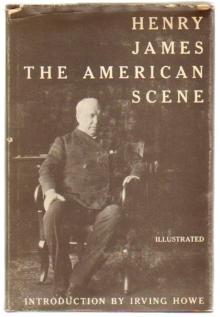 The American
The American The Wings of the Dove, Volume 1 of 2
The Wings of the Dove, Volume 1 of 2 Frost at Midnight
Frost at Midnight Morning Frost
Morning Frost The Portrait of a Lady — Volume 1
The Portrait of a Lady — Volume 1 Fatal Frost
Fatal Frost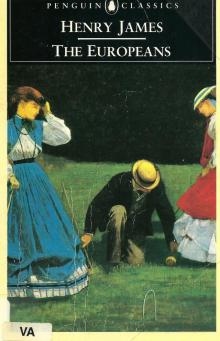 The Europeans
The Europeans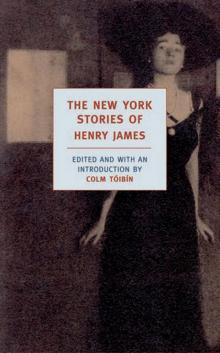 The New York Stories of Henry James
The New York Stories of Henry James Great Short Novels of Henry James
Great Short Novels of Henry James Washington Square
Washington Square The Portrait of a Lady — Volume 2
The Portrait of a Lady — Volume 2 The Ambassadors
The Ambassadors The Wings of the Dove
The Wings of the Dove The Princess Casamassima (Classics)
The Princess Casamassima (Classics) The Coxon Fund
The Coxon Fund First Frost
First Frost Henry James
Henry James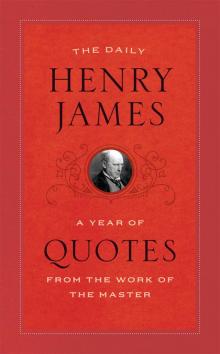 The Daily Henry James
The Daily Henry James Travels With Henry James
Travels With Henry James The Reverberator: A Novel
The Reverberator: A Novel What Maisie Knew (Henry James Collection)
What Maisie Knew (Henry James Collection)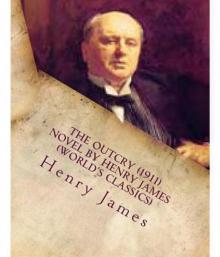 The Outcry
The Outcry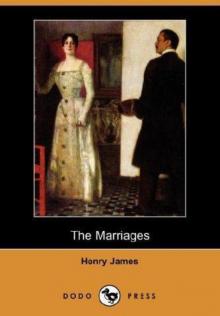 The Marriages
The Marriages The Wings of the Dove, Volume 2
The Wings of the Dove, Volume 2 The Bostonians, Vol. I
The Bostonians, Vol. I The Outcry: -1911
The Outcry: -1911 The Complete Works of Henry James
The Complete Works of Henry James Letters from the Palazzo Barbaro
Letters from the Palazzo Barbaro The Pupil
The Pupil The Bostonians, Vol. II
The Bostonians, Vol. II Pandora
Pandora Glasses
Glasses The Princess Casamassima
The Princess Casamassima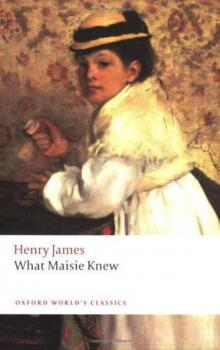 What Maisie Knew
What Maisie Knew The Reverberator
The Reverberator The Golden Bowl - Complete
The Golden Bowl - Complete Confidence
Confidence Wings of the Dove (Barnes & Noble Classics Series)
Wings of the Dove (Barnes & Noble Classics Series) The Spoils of Poynton
The Spoils of Poynton